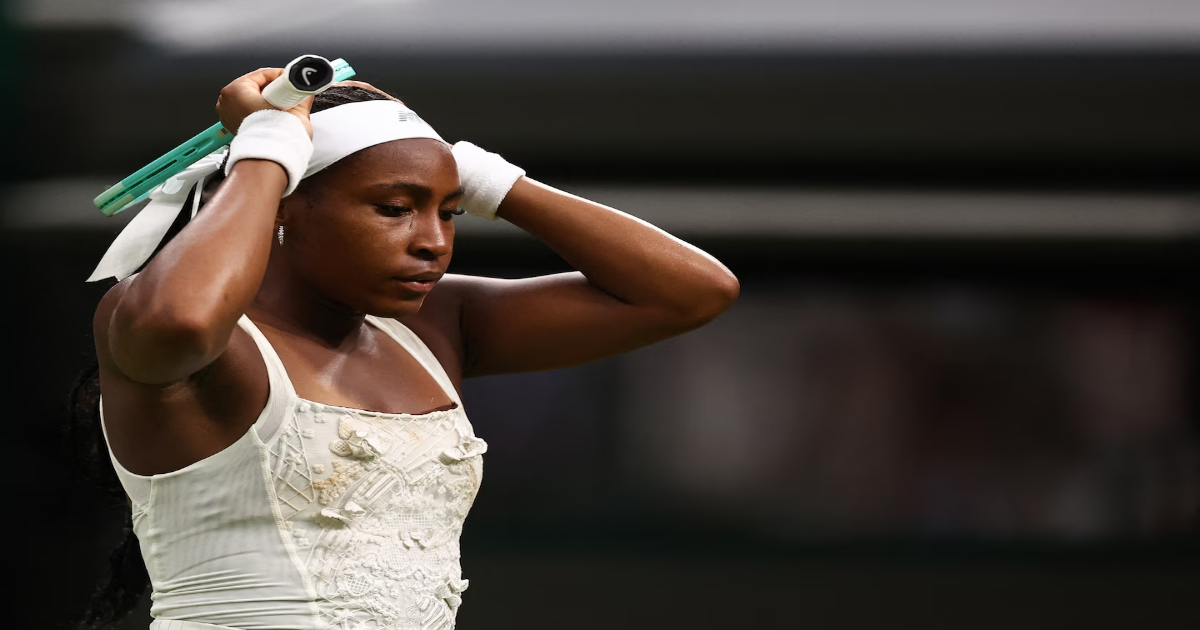WIMBLEDON, England — As high seed after high seed tumbled in Wimbledon’s first round Tuesday, players searched for a unifying answer. Could the unseasonably warm weather have something to do with the carnage? Possibly. Some cited the lack of a good night’s sleep in the houses they rent during the tournament — like most English homes, they don’t have air conditioning.
But most agreed that the simplest answer feels most likely: Grass-court tennis is full of surprises.
That certainly rings at least partly true for the biggest upset of the day: No. 2 seed Coco Gauff followed up her French Open title of three weeks ago by falling to world No. 42 Dayana Yastremska, 7-6 (7-3), 6-1, in just 1 hour 18 minutes. It was the first time in Gauff’s past eight Grand Slam appearances in which the 21-year-old did not make at least the fourth round.
Another American, No. 3 Jessica Pegula, also lost Tuesday, making this year’s Wimbledon the first in the Open era, which began in 1968, in which two of the top three women’s seeds bowed out in the first round, according to ESPN. The No. 5 seed, Zheng Qinwen, lost, too. And No. 9 seed Paula Badosa fell Monday.
The men weren’t spared, either: No. 3 Alexander Zverev, No. 7 Lorenzo Musetti, No. 8 Holger Rune and No. 9 Daniil Medvedev were bounced in the first round. That means just six of the top 10 players in each draw remain.
On the women’s side, that leaves No. 1 Aryna Sabalenka, No. 4 Jasmine Paolini, No. 6 Madison Keys, No. 7 Mirra Andreeva, No. 8 Iga Swiatek and No. 10 Emma Navarro. And while the heavy culling was shocking on both halves of the tournament, players are accustomed to a healthy level of churn in the women’s field. Wimbledon has been the least predictable Grand Slam for the better part of the past decade. Unless Barbora Krejcikova, who won last year’s tournament as the No. 31 seed, defends her title, Wimbledon will crown its ninth different women’s champion in as many tournaments July 13.
Part of that, players say, is the fickle nature of grass. Big servers such as Elena Rybakina, the 2022 champion, can get hot, and crafty hitters such as 2023 champion Marketa Vondrousova and Krejcikova can discombobulate power players by taking advantage of the speed of the playing surface and the flattening effect it has on the ball.
But many players are figuring things out on the fly — unlike in the clay- and hard-court seasons, which feature long lead-ups that culminate in Grand Slams, players have roughly three weeks between the end of the French Open and the start of Wimbledon to adjust to playing on grass. Many spend just a few weeks per year playing on the stuff.
“It’s a tricky surface,” Pegula said at a news conference Sunday, the day after she won a grass-court tournament in Germany. “There’s a lot of weird points and weird momentum swings. If someone’s serving really, really well, sometimes there’s not much you can do.”
In Gauff’s case, the tournament that made her a star at 15 thanks to an upset of Venus Williams and a fairy-tale run to the fourth round remains the Grand Slam that bedevils her most. She owns the 2023 U.S. Open title and won at Roland Garros last month. She has made it as far as the semifinals at the Australian Open.
But at Wimbledon, she has never performed better than she did in her debut, and she has alternated promising-looking runs with early exits.
“I have faith that, if I can make these adjustments, I can do well here. I really do want to do well here,” she said. “I’m not someone who wants to write myself off grass this early in my career, but I definitely need to make changes if I want to be successful here.”
Gauff was never in rhythm Tuesday, partly because her preparation for the tournament was off, she said. Never before had she needed to take into account celebrating a Grand Slam win when deciding how to divide her time between rest and training on grass. She said she was a bit overwhelmed mentally after winning in Paris.
She looked as much Tuesday, hitting just six winners against 29 unforced errors, which included nine double faults. Yastremska, who has three WTA singles titles but has never cracked the top 20, remained steady in the face of a partisan crowd cheering Gauff on. The Ukrainian had lost all three of their previous meetings but now advances to face Russia’s Anastasia Zakharova.
Gauff can take some solace in the fact that she has been here before. The previous time she lost in the first round at Wimbledon, she rebounded to win the U.S. Open. But there was little room for positivity Tuesday as a puffy-eyed Gauff dissected her performance at a news conference, fighting back tears all the while.
“I don’t really like losing. I just feel a little bit disappointed in how I showed up today. I feel like I could have been a little bit better in those tough tiebreaker moments — especially after Roland Garros, where I felt like I learned a lot in those tiebreakers,” Gauff said. “I’m not going to dwell on this too long because I want to do well at the U.S. Open. Maybe losing here [in the] first round isn’t the worst thing in the world because I have time to reset.”
